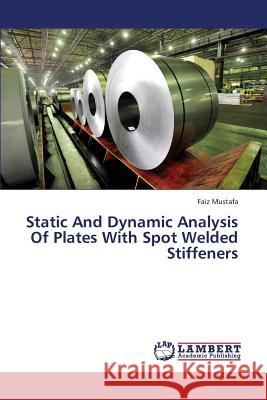Static and Dynamic Analysis of Plates with Spot Welded Stiffeners » książka
Static and Dynamic Analysis of Plates with Spot Welded Stiffeners
ISBN-13: 9783659193002 / Angielski / Miękka / 2013 / 224 str.
The theoretical approach was based on the theory of bending of orthotropic thin plates was used to obtain the governing differential equation. The strain energy stored in a plate element due to bending, twisting and the mid-plane force was obtained. Expressions of the exact frequency equations for stiffened plate model having a straight line array of spot welding with and without the effect of residual stresses for the cases: C-C-C-C, C-S-C-C, C-S-C-S, S-S-S-S, S-C-S-S, C-S-S-C, C-F-C-C, C-F-S-C, S-F-S-C were obtained. A numerical analysis of spot welding process using finite element method was presented to establish the temperature and residual stress distributions for stainless steel thin plate. Nonlinear transient heat transfer analysis using welding parameters, such as heat generation and free convection with ambient was performed in order to obtain the temperature. Thermo-plastic stress analysis was then performed to predict the stress and strain fields during and after welding. Residual stresses are results of the temperature gradient and the dependency of material properties on the temperature.
The theoretical approach was based on the theory of bending of orthotropic thin plates was used to obtain the governing differential equation. The strain energy stored in a plate element due to bending, twisting and the mid-plane force was obtained. Expressions of the exact frequency equations for stiffened plate model having a straight line array of spot welding with and without the effect of residual stresses for the cases: C-C-C-C, C-S-C-C, C-S-C-S, S-S-S-S, S-C-S-S, C-S-S-C, C-F-C-C, C-F-S-C, S-F-S-C were obtained. A numerical analysis of spot welding process using finite element method was presented to establish the temperature and residual stress distributions for stainless steel thin plate. Nonlinear transient heat transfer analysis using welding parameters, such as heat generation and free convection with ambient was performed in order to obtain the temperature. Thermo-plastic stress analysis was then performed to predict the stress and strain fields during and after welding. Residual stresses are results of the temperature gradient and the dependency of material properties on the temperature.











